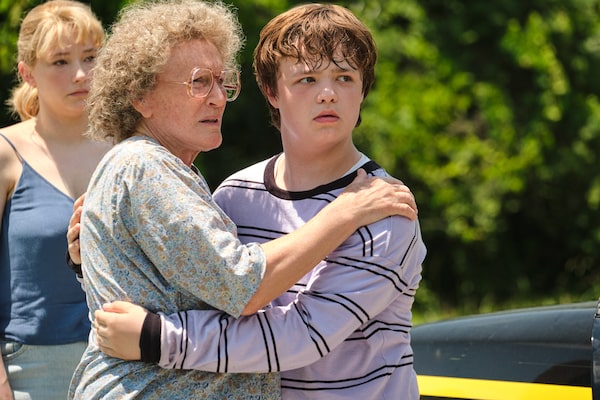- Hillbilly Elegy
- Directed by Ron Howard
- Written by Vanessa Taylor, based on the memoir by J.D. Vance
- Starring Amy Adams, Glenn Close and Gabriel Basso
- Classification: R; 116 minutes

Glenn Close and Amy Adams star in director Ron Howard's Hillbilly Elegy.Lacey Terrell/NETFLIX/NETFLIX
The knives are out for Hillbilly Elegy, but they’re trained on the wrong hollar.
When Netflix premiered its trailer for Ron Howard’s new drama, two social-media-enabled factions emerged. The first zeroed in on the ridiculousness of having stars Amy Adams and Glenn Close engage in a round of working-class America cosplay, all frazzled hair and lip-dangled cigarettes and oversized T-shirts. The second faction feared that any movie based on the controversial memoir by self-proclaimed “nationalist” J.D. Vance was destined to portray an entire swath of Americans as good-for-nothing caricature. (There was also a quieter, third bloc that just really, really, really wanted the perpetually passed-over Adams and Close to win their Academy Awards already.)
Any way, Hillbilly Elegy seemed doomed from every angle. Except the one that asked whether the movie itself was compelling. Which, by the way, it’s not. Make no mistake: Ron Howard’s Hillbilly Elegy is a bad film, inert and clichéd and largely devoid of cinematic imagination. But it is not a problematic film. Or as culturally incendiary a production as the internet predicted. In contemporary American electoral politics, maybe this half-fail counts as a win. But I can only tally a loss.

The film is adapted from the memoir of J.D. Vance, played by Gabriel Basso, centre.Lacey Terrell/NETFLIX/NETFLIX
Indeed, the thought of rewatching Howard’s film, which Netflix acquired the rights for in a heated bidding war, is enough to qualify as post-traumatic stress disorder. The director’s professional, too-smooth-to-trust hands usually mash whatever material is chucked his way into a curiously flattened state of bland nothingness (A Beautiful Mind, The Dilemma, The Da Vinci Code). Here, though, he’s decided to unleash a death grip on Vance’s story, crushing its potentially interesting arc – poor boy turns Yale law graduate – into as finely disposable a powder as the Cheetos dust covering the kitchen counter of Vance’s grandma. Or Mamaw to you.
Practically, this means that Howard and screenwriter Vanessa Taylor jettison most of Vance’s overreaching attempts at cultural generalizations and focus instead on the author’s intense and turbulent family drama.
Spending the summers of his youth in Breathitt County, Ky., and the rest of the year in the crumbling urban decay of Middletown, Ohio, the teenage Vance (Owen Asztalos) faced no shortage of domestic obstacles: a heroin-addicted mother (Adams) and her rotating cast of bad-news suitors, a no-nonsense grandma (Close) who could barely afford to feed herself and a general sense that life was never going to get any better. Yet, somehow, he survived, as evident from the film’s flash-forwards to an adult Vance’s (Gabriel Basso) time at Yale, and with his Appalachia-strong values (you know, family, standing up for yourself, etc.) intact.
Vance’s rise out of poverty is ultimately predictable and funnelled through a hackneyed cinematic filter that favours loud, clanging performances and overwrought visuals over anything resembling subtlety. But at least Howard and Taylor don’t pretend that their story can also be read as a primer on Donald Trump country, as Vance’s memoir attempted.

Adams's performance is pitched up to the level of second-tier sketch comedy.Lacey Terrell/NETFLIX/NETFLIX
While Vance serves as the film’s narrator, we are thankfully spared such pulled-from-the-book declarations as, “We spend our way to the poorhouse. … We purchase homes we don’t need, refinance them for more spending money and declare bankruptcy, often leaving them full of garbage in our wake. Thrift is inimical to our being.”
We are gifted, though, such all-timers as “We were all different in Middletown somehow. I dunno, like something was missing. Like maybe hope.” Win some, lose some.
This isn’t to say that the film doesn’t traffic in Vance’s chosen literary genre of poverty porn. Barely one minute into Howard’s film and there are already three separate shots of broken-down cars. Unlike other contemporary chroniclers of working-class America – see Chloe Zhao’s upcoming Nomadland for a more thoughtful story about what happens when a country neglects its people – Howard stages his images as if working from a Pinterest board of hard-knock key-words: “Appalachia,” “welfare,” “rust belt.”
For the Adams and Close obsessives still reading, yes, there is a good chance that this strange, thin-on-content year will result in the two getting just that much closer to the Oscars podium. But while Close embraces her role as the tough-talking Mamaw with impressive stamina, Adams’s turn feels more crassly engineered. Think of her performance in David O. Russell’s The Fighter, but pitched to the level of second-tier sketch comedy. Adams screams and glares and spits fury whenever Howard asks for it, but it’s more calculated than honest – a portrait of redneck-ism as imagined by MADtv.
Vance has a skeleton-key-like line in his memoir in which he writes, of Appalachia’s apparently universal misfortune, that “there is no government that can fix these problems for us … it starts when we stop blaming Obama or Bush or faceless companies and ask ourselves what we can do to make things better.”
But if we can’t ask Netflix what it would have done to make Hillbilly Elegy better, we’re left to only query Howard and Vance. And I just don’t think either man has the answer.

Close embraces her role as the tough-talking Mamaw with impressive stamina.Lacey Terrell/NETFLIX/NETFLIX
Hillbilly Elegy opens in select Canadian theatres Nov. 11; it will be available to stream on Netflix starting Nov. 24
Plan your screen time with the weekly What to Watch newsletter. Sign up today.
 Barry Hertz
Barry Hertz